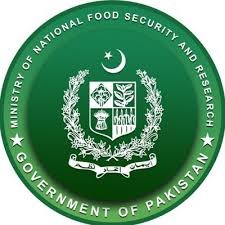KARACHI: The newly appointed Director General of the National Agri Trade and Food Safety Authority (NAFSA) has reportedly withdrawn the current charges held by Dr. Muhammad Basit, Deputy Director (BS-18), who had been exercising authority over three senior Director-level posts in alleged violation of service rules. The move follows mounting complaints, internal evidence, and media reports linking Dr. Basit and his associates to alleged corruption, abuse of power, and administrative irregularities.

Mr Basit
Charges withdrawn after complaints and evidence:
According to official sources, the decision to remove Dr. Basit was taken after several inquiries and internal audits reportedly confirmed financial irregularities, misuse of authority, and illegal manipulation in the issuance of quarantine and pesticide-related permissions. The inquiry process, sources said, is ongoing to determine the full scope of irregularities during his tenure.
Sources within NAFSA disclosed that Dr. Basit had been holding current charges of Director Quarantine, Director Registration, and Director Locust—all BS-19 posts—despite himself being in BS-18. These charges, sources allege, were obtained during the tenure of Dr. Syed Bilal Haider, former Joint Secretary (Admin) at the Ministry of National Food Security and Research (MoNFS&R). Dr. Haider has been accused in several internal reports and media stories of acting as a key facilitator for allegedly irregular transfers and postings during the Buzdar-led Punjab government.
Links to past corruption allegations:
Reportedly, internal records and prior investigative reports have highlighted alleged links between Dr. Basit, Dr. Haider, and former DG NAFSA Tahir Abbas in matters of quarantine approvals, pesticide registrations, and consignment clearances. Insiders claim the trio were instrumental in granting biosecurity clearance to infested consignments of agricultural commodities including wood, garlic, ginger, coconut, apples, dried fruits, oilseed grains, ginned cotton, and spices through a network of subordinate entomologists and inspectors.
According to these reports, consignments were allegedly cleared without prescribed fumigation or treatments, in violation of Pakistan Plant Quarantine Rules, 2019. The approvals, sources allege, were often granted in exchange for bribes or commissions routed through intermediaries, particularly in Karachi and Quetta stations.
Also read: https://thepublictribune.com/controversial-transfers-and-allegations-of-corruption-shake-nafsa/
Pattern of financial irregularities:
Sources inside the Federal Investigation Agency (FIA) and MoNFS&R claim that both Tahir Abbas and Muhammad Basit were involved in the issuance of illegal NOCs and registrations of banned or substandard pesticides through compromised officials, including entomologists responsible for registration and inspection. Records reportedly show that substandard pesticides worth over Rs 400 million were released to market, while illegal import and sale of banned pesticides worth over Rs 2 billion were facilitated under their supervision.
Further, import consignments of undevitalized and genetically engineered oilseed grains valued at approximately Rs 40 billion, along with 2,500 untreated cotton shipments worth nearly Rs 37 billion, were allegedly cleared in exchange for kickbacks. Multiple timber shipments, valued collectively at over Rs 25 billion, were also reportedly released without mandatory treatment, with clearance deals estimated between Rs 12,000–15,000 per container.
Read also: https://thepublictribune.com/half-a-dozen-dpp-officials-suspended-over-misconduct/
Previous cases against Dr. Basit:
Official records indicate that Dr. Muhammad Basit was earlier implicated in FIA Anti-Corruption Case No. 2/2019 registered in Karachi, concerning the release of the soybean vessel VITA OCEAN despite “unfit” laboratory reports from Karachi University and PARC labs. He allegedly received Rs 16 million for clearing the vessel. Dr. Basit also faced a separate corruption and fraud case in Bahawalpur, for which he was reportedly jailed for 15 days, and later detained for five months in the Karachi case.
Despite these proceedings, no departmental action was taken against him during the tenure of Dr. Syed Bilal Haider, reportedly due to political influence and alleged monthly payments received from officials under inquiry.
Connections and financial interests:
Sources inside NAFSA have revealed that Dr. Basit and his associates allegedly hold a 50 percent share in private fumigation and pesticide firms including M/s Ahmad and Kamran Traders (Islamabad and Quetta) and Al-Abbas Agri Care Fumigation Company (Karachi)—companies owned or managed by his close associates Israr Khan, Hanzala Khan, Ahmad Yar Kakar, and Muhammad Qasim Khan Kakar.

Israr Khan
Reportedly, importers were coerced to utilize these firms for clearance and fumigation services, with those refusing allegedly facing deliberate delays or denial of quarantine approvals.
Role of other officials and networks:
The alleged corruption network reportedly extended to Dr. Tahir Abbas, who, according to sources within FBR, has recently been posted as Chief OPS Customs through what insiders describe as “influential connections” and heavy monetary inducements. The posting, reportedly approved by Member Customs Syed Shakeel Shah, has sparked internal criticism within FBR, where several officers are awaiting placement.
According to departmental documents and whistleblower accounts, Qasim Khan Kakar, a deputationist from the Balochistan Agriculture Research Institute (ARI), Quetta, joined the former Department of Plant Protection (DPP) as Director Admin on a reportedly fake experience certificate facilitated by Israr Khan, a UK-based clearing agent. His posting allegedly involved payments of up to Rs 5 million during the interim government period. Later, after being surrendered, he was reinstated as Deputy Secretary (Planning), MoNFS&R, allegedly through another monetary deal.
Impact on exports and agriculture:
Industry experts and trade sources report that the alleged corruption and malpractice under the previous NAFSA management have had a direct and adverse impact on Pakistan’s agricultural exports. From January to October 2025, official data indicates a 75% decline in corn exports to Vietnam, 80% drop in rice exports to the EU, 70 interceptions of Pakistani consignments at destination ports, and a 30% decline in mango exports to the EU.
Exports of sesame to China reportedly dropped by 30%, citrus to Russia by 40%, and mangoes to Iran by 60%, while imports of oilseeds, pulses, and dried fruits surged — a trend officials attribute to compromised quarantine enforcement and quality control.
Failure to reform and alleged manipulations:
The group of officers, according to sources, also failed to expand the list of licensed methyl bromide importers despite directives from the Prime Minister’s Office and the MoNFS&R to break existing monopolies. Instead, they allegedly released infested shipments without treatment, under-reporting fumigant usage to mislead the PM Office. Officials also claim they extorted funds from major pesticide importers by delaying regulatory amendments to maintain monopolistic control.
Sources further revealed that the group arbitrarily revoked the registration of one importer, PMS, despite certification from the Pakistan High Commission in Australia confirming the authenticity of its manufacturer. The move, reportedly intended to benefit associated firms, was also allegedly used to blackmail other importers by threatening similar action against those with products registered in both India and Australia.
Accountability and institutional response:
According to sources at the Ministry of National Food Security, the names of 45 former officers including Secretaries, Additional Secretaries, Joint Secretaries, Directors General, and Technical Directors from 2005 to 2024 were recently included in an internal accountability list related to the failure to operationalize the Central Plant Quarantine Laboratory (CPQL). The inclusion of names was reportedly selective, with insiders alleging personal vendettas and exclusion of favored officers.




